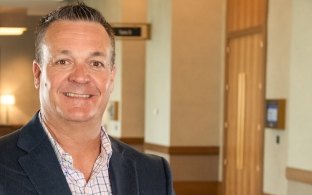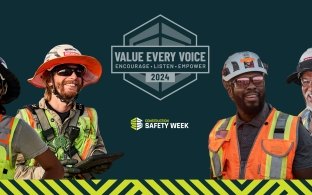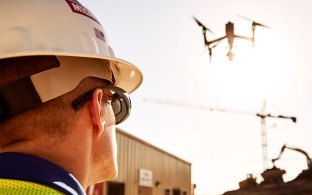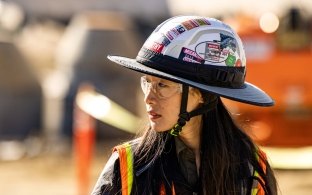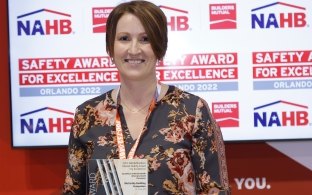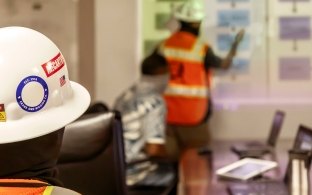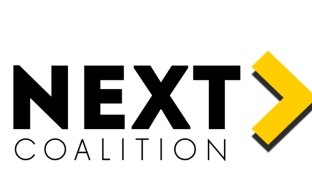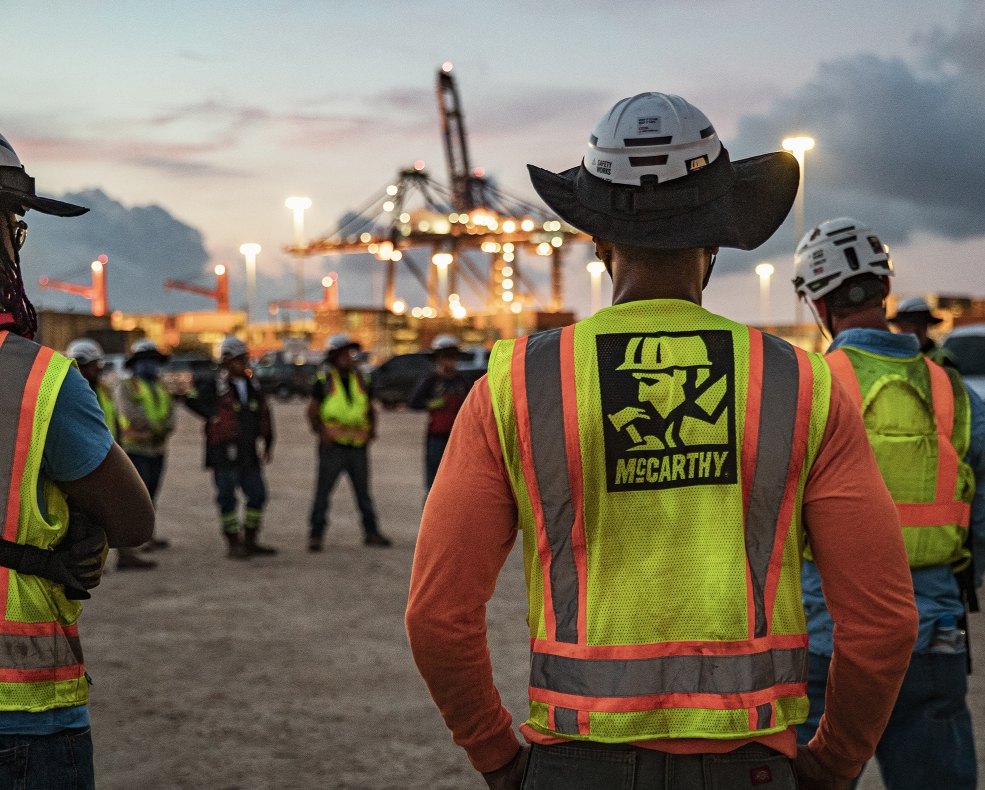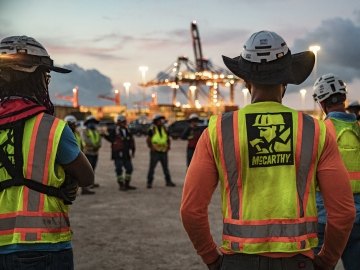Safety Week Spotlight: Taking Pride in Safety Across McCarthy Projects
From solar fields to hospitals, McCarthy teams are showcasing their commitment to proactive, people-first safety during Safety Week—driving innovation, collaboration, and continuous improvement across jobsites.

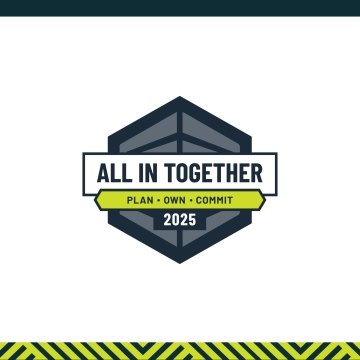
From renewable energy projects in Arizona and Illinois to a major hospital expansion in California and a high-security industrial project in the Central region, McCarthy teams are raising the bar for safety across the board. These projects differ in scope and complexity, but they share one thing in common: a proactive, people-first approach to keeping jobsites safe. Through innovative tools and strong collaboration, teams are not just meeting safety goals—they’re driving continuous improvement.
Centennial Flats
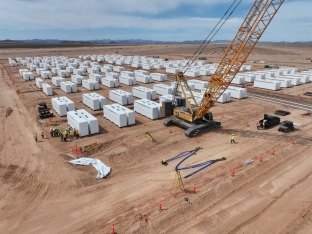
The Centennial Flats Solar and BESS project in Salome, AZ is making great progress—and safety has been a major focus from the start. With about 450 people on site, this is a big operation, covering 4,795 acres and 129 blocks of solar panels. Upon completion Centennial Flats will have over 1.1 million modules installed and the project will generate 675 MWdc and 1,068 megawatt hours (MWh) of BESS capacity.
From day one, the team has been serious about creating a strong safety culture. Everyone who steps on site is committed to being transparent and proactive when it comes to safety.
What’s really helped set this project apart is the strong alignment between McCarthy, our trade partners, and the owner. Everyone is on the same page, working together with safety as a shared priority. Centennial Flats currently ranks second across the company in McCarthy Vital Process (MVP) submissions. This internal behavioral-based safety program is designed to engage all employees to identify and eliminate unsafe behavior and conditions before an accident or incident occurs. By measuring safety performance prior to an accident happening, the team can do a statistical review of leading indicators to evaluate and continue to prevent an accident from occurring.
The team is also leaning into new technology–-a QC robot helps with quality checks in extreme heat-–keeping a person from working alone and in the heat.
Tesla megapacks for power storage are being installed quickly and efficiently, setting the record for the most installed in a single day. In one eight-hour day, 37 megapacks were installed with no damage or safety incidents while working in rainy conditions. Tesla plans to recognize the team’s achievement with a unique trophy. In just 20 days, 318 Megapacks were set in place, a feat that required precise coordination and planning across the entire project team. The project’s logistics strategy was exceptionally well-organized, featuring a streamlined system for delivery trucks and an innovative installation approach. Rather than following a traditional linear layout, the team strategically positioned the Megapacks to minimize the need to reposition the conventical crawler crane. This not only improved efficiency but also enhanced worker safety throughout the process.
A final highlight of this project was its strong comradery and culture—many of the craft professionals working on site commute long distances each day just to be part of this team. This speaks volumes to the project’s positive environment and the trust workers have in McCarthy’s commitment to their safety and well-being.
Casey Fork
The Casey Fork solar project in Texaco, IL spans 831 acres—part of a larger 2,000-acre leased area—and is crisscrossed by county roads and waterways. The project scope includes installing 58,100 piles, 3,600 trackers, and 357,400 solar modules. The project is about 90% done, with only electrical and commissioning activities remaining.
Safety has been a focus on this project from day one, and the results speak for themselves—their total project incident rate is zero so far, covering both trade partners and McCarthy's self-perform crews. A big part of that success comes from leaning into the MVP, or McCarthy Vital Process, which keeps everyone—from leadership to field staff—actively engaged in safety. Regular planning sessions and daily check-ins help keep safety top of mind across the site.
One of the unique challenges the team tackled is managing deliveries through two nearby school zones. To keep things safe, they set up a designated staging area for trucks and had them escorted through. On top of that, the team has implemented forward-thinking safety practices, like utilizing hydro-excavation, a non-destructive digging method that uses pressurized water and a powerful vacuum to excavate soil, minimizing the risk of damage to existing underground utilities.
All of these efforts have helped the team maintain an incident-free site, with positive feedback from both trade partners and the project owner.
Hoag Hospital Irvine Campus Expansion
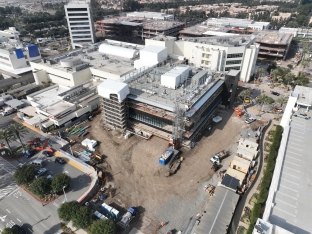
The Hoag Hospital Irvine Expansion is a major healthcare campus expansion project, representing a $575 million investment into six new buildings, two underground tunnels, and an upgrade to their existing CUP. The expansion adds one new facilities management building, three new inpatient hospital buildings, and three health support facilities, all in order to help an ever-growing client with expanding their health services to the local community. The existing hospital is located right in the middle of the campus and is surrounded by active construction. Even with all the ongoing activity taking place, it has been able to stay fully operational without interruption by having the project team keep safety front and center, paying attention to the public’s needs, and using creative solutions to build a strong and positive culture.
As part of these efforts, the team has focused on getting back to the basics. The team hosts weekly All-Hands Safety Meetings with over 400 craft workers to review relevant topics and ongoing activities at the site. These meetings help align the team, proactively identify potential issues, and—most importantly—maintain open communication across the site. They’ve also added a fun and positive twist to safety recognition, that was adapted from McCarthy's Las Vegas team, where McCarthy staff hand out poker chips to field workers who demonstrate safe practices. These poker chips can be traded in at the food truck for free lunch meals or at the office for McCarthy swag.
The project team is also leveraging Power BI to monitor safety metrics and leading indicators in real time, allowing them to proactively address potential risks and positively recognize team members who are going above and beyond with their THA and MVP participation. Separately, all McCarthy staff have laminated printouts of the hospital campus in their safety vest in case they need to help direct public, patient, or staff traffic through the campus around all the construction. Finally, a QR code has been set up on-site for any workers to provide anonymous feedback for any items they may feel need to be addressed. As a result of this feedback, McCarthy has been able to identify blind spots on the site along with gaining new perspectives on how the site is seen from others.
The results speak for themselves. The project has over 450,000 work hours logged, and the team’s focus on the basics, public and patient-first mindset, strong trade partner communication, and positive recognition, have all contributed to the project’s collective success.
Confidential Industrial Project
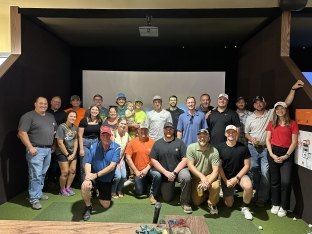
McCarthy’s team on a confidential industrial project in the Central region is setting a high bar when it comes to safety. Before any work kicks off, they walk through each step with detailed processes and work plans, making safety a natural part of everything they do.
Daily operations kick off with safety moments in meetings, often backed by real-time data through Power BI so everyone stays informed and engaged. There’s a lot of collaboration happening behind the scenes too, with the team constantly identifying ways to improve safety before work even begins through Task Hazard Analyses and work plans.
One of the standout features on-site is the use of the “fall cube”—an 8,000-pound concrete-filled metal box with articulating booms for tie-offs. It’s designed to provide fall protection and also doubles as a confined space.
The project team also created a scratcher ticket rewards program to reinforce proactive safety behavior. Each ticket offers a chance at an instant prize—and even if it’s not a winner, the recipient is entered into a monthly drawing for a larger reward. Everyone on the project has leaned into this—going above and beyond to voice concerns and fix behaviors.
The team’s commitment to a strong safety culture is delivering real results. With 975,000 hours worked, this is a clear reflection of their proactive approach to maintaining a safe, efficient jobsite.

